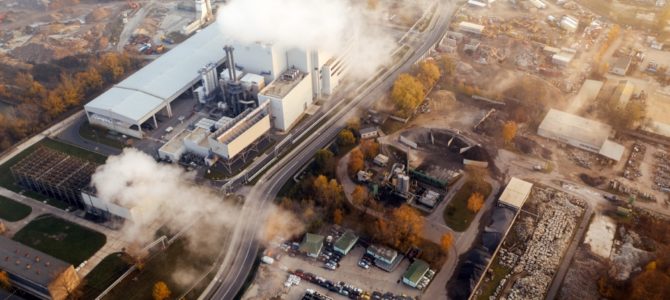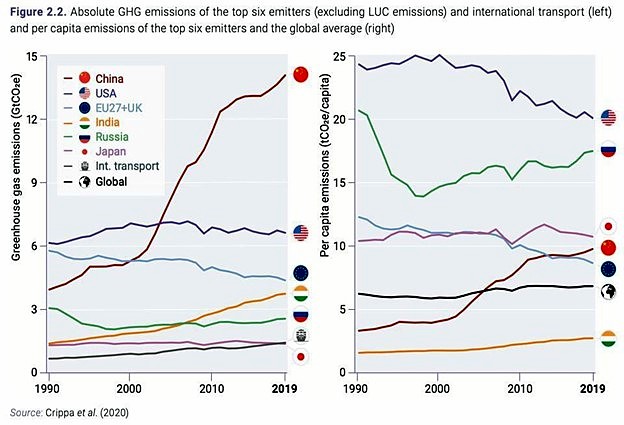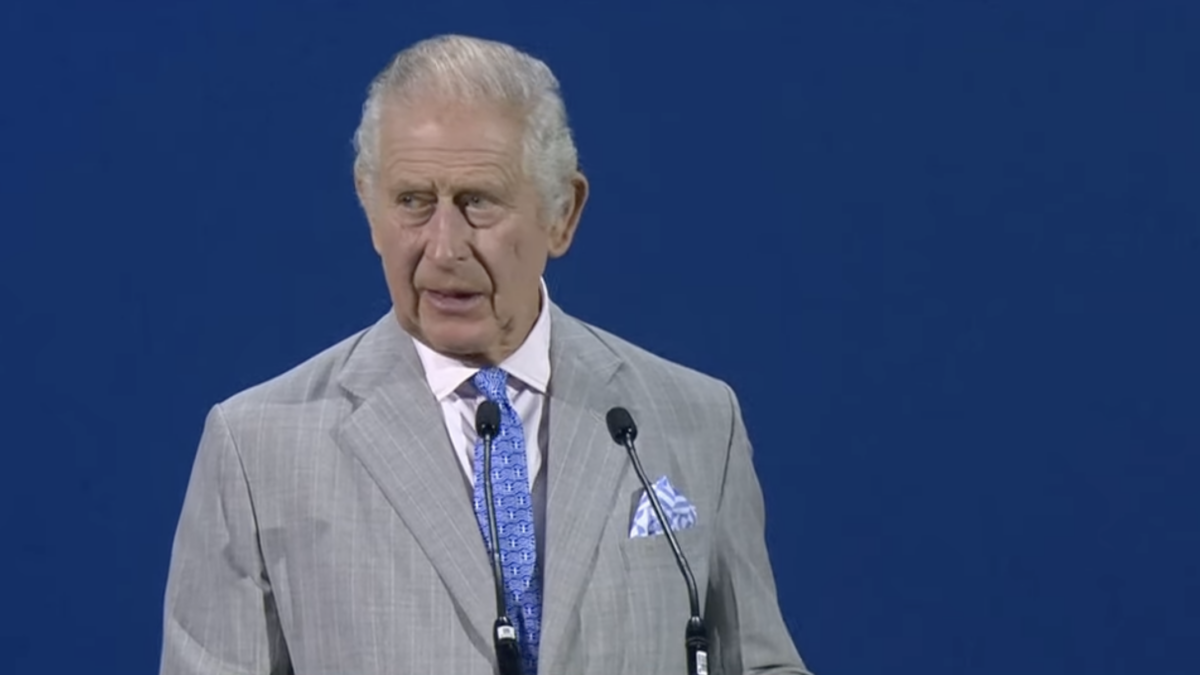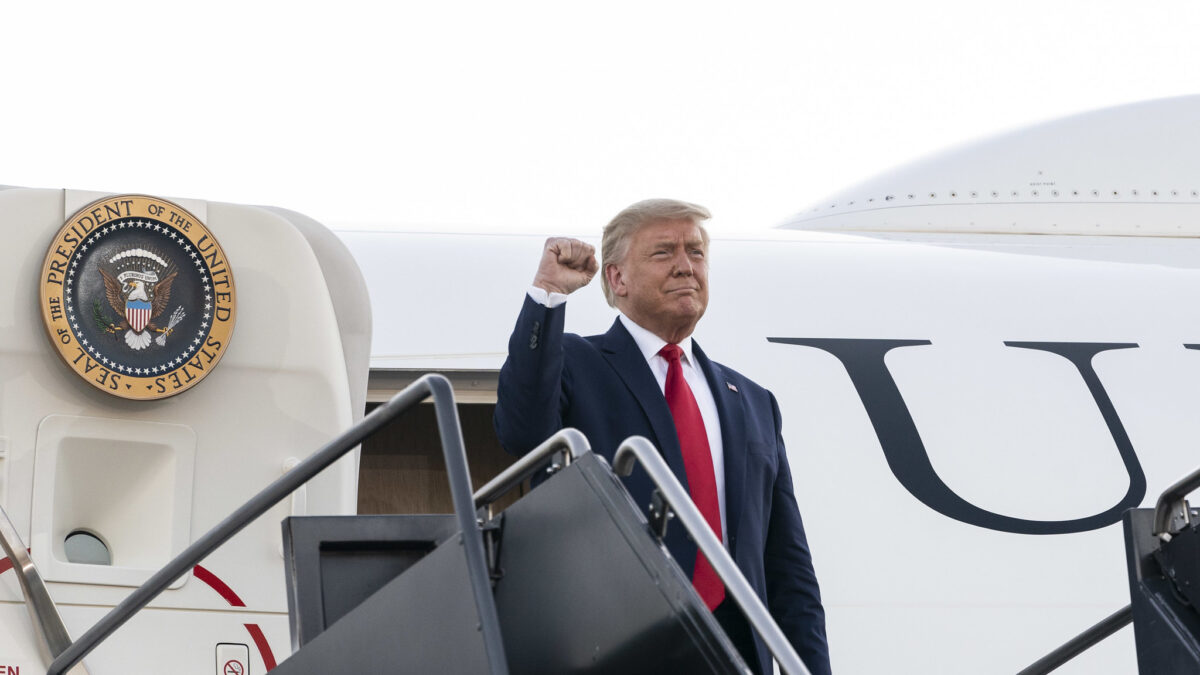
With President Biden signing a series of executive orders aimed at combating climate, he appears more than willing to sacrifice both the economy and good-paying American jobs to theoretically reduce greenhouse gas (GHG) emissions. Biden’s climate czar, John Kerry, seems to believe America must have China’s cooperation to succeed in emissions reduction.
Yet, according to the latest United Nation’s Emissions Gap Report 2020, Biden and Kerry couldn’t be more wrong. In truth, the United States has done more for reducing GHG emissions than China ever has, and China is neither a leader nor a reliable partner on this issue.
The United Nations Environment Programme releases the annual Emission Gap Report to assess the gap between projections of greenhouse emissions in 2030 and where they should be “if countries implement their climate mitigation pledges.” In a sense, the report yearly nags nations to move toward “the temperature goals of the Paris Agreement.”
The objective of the accord is to reduce man-made greenhouse gas emissions to limit global warming to 3.6 degrees Fahrenheit, or 2 degrees Celsius. Former President Obama committed the United States to the Paris Climate Accord in 2015, and regarded the Paris Climate Accord as one of his “legacy” projects, even refusing to issue a permit to the Keystone XL pipeline.
Obama’s reasoning? That the pipeline would generate so many GHG emissions it would jeopardize America’s commitment to the Paris Accord, even though his own State Department found no evidence to support such a claim after conducting five studies in seven years.
The Heritage Foundation estimates the United States’ commitment to the Paris Accord would cost the average American family of four $20,000 and the national gross domestic product $2.5 trillion by 2035 while achieving an insignificant amount of reduction in global temperature.
In 2017, President Trump pulled the United States out of the Paris Accord, an action he explained to be both “in America’s economic interest” and “won’t matter much to the climate.” He also vowed that under his administration, the United States would “continue to be the cleanest and most environmentally friendly country on Earth.”
Needless to say that his decision was widely condemned by environmental activists, progressive groups, celebrities, corporate America, and many of our allies. Kerry called Trump’s action an “abdication” of leadership and “self-destructive.”
America Receives a Glowing UN Climate Report
Now, the verdict is in — not from any right-wing source, but the latest climate report released by the United Nations. In combating GHG emissions, there’s nothing but good news to report about the United States.
The United States’ overall GHG emissions “have been in decline (0.4 percent per year)” over the last decade, while those of China continue to spike up, growing at an average of 2.4 percent per year. Although the GHG emissions on a per capita basis in the United States is still the highest in the world, the number is coming down sharply while those of other major economies such as China and India are trending up.

What’s especially noticeable is GHG emissions in the United States continued to go down even after the Trump administration withdrew from the Paris Accord. The continued reduction came when the United States was experiencing a booming economy and the construction of the Keystone XL pipeline was underway.
The first lesson from the U.N. climate report is that the United States is on a good trajectory to address climate-related issues and has made consistent and meaningful progress. As a nation, the United States does not have to sacrifice its economy and the jobs of American workers to protect the environment. Unfortunately, however, President Biden has already ignored this lesson, with his Day One executive order directing the United States to rejoin the Paris Accord.
In contrast to the good news out of the United States, the U.N. report presented some glooming news for those who remain within the Paris Accord: global greenhouse gas emissions continued to grow for the third consecutive year in 2019. Although GHG emissions are expected to come down in 2020 mainly due to worldwide lockdowns in response to the coronavirus pandemic, the EG report believes such a one-year reduction will “have an insignificant impact” on global temperature.
The main culprit of this worsening trend is China, a nation that “emits more than one-quarter of global GHG emissions and has per capita emissions that are around 40 percent above the global average.” Indeed, China’s annual GHG emission is almost equivalent to the sum of those of the United States of America, EU27+UK, and India.
China Is the Problem, Not the United States
Despite all of the evidence indicating China is the biggest polluter of this planet, China’s leader, Xi Jinping, knows how to talk the “green talk” to appeal to left-wingers in the west while doing nothing they actually want on this issue.
When the United States withdrew from the Paris Accord in 2017, Xi wasted no time in offering China as an alternative to the United States. He cast himself as the new leader on climate change. He said: “The Paris agreement is a milestone in the history of climate governance. We must ensure this endeavor is not derailed … China will continue to take steps to tackle climate change and fully honor its obligations.”
The Global Energy Monitor estimates that China will need to reduce its coal power capacity by 40 percent over the next decade to meet its climate goal as stated in the Paris agreement. Yet the opposite happened. Since signing up for the Paris Accord, China has built more new coal plants inside China than any other country, just as its coal plant capacity is expected to increase 10 percent by 2025.
Additionally, the Chinese government made building coal-fired power plants abroad a top priority within its controversial global infrastructure program, “Belt and Road.” According to Edward Cunningham, a specialist on China at Harvard University, China is “building or planning more than 300 coal plants in places as widely spread as Turkey, Vietnam, Indonesia, Bangladesh, Egypt, and the Philippines.”
Some accuse China of exporting pollution to boost its economy. Besides environmental concerns, the National Public Radio reported that more than 25 percent of coal plants outside China that are under construction by Chinese contractors are financed by Chinese state-owned financial institutions. Poorer nations that can’t pay back their Chinese loans may have to trade their strategic assets to China to pay off their debt.
While the facts on the ground contradict Xi’s lofty rhetoric, they haven’t prevented Xi from making an even loftier promise — at last year’s U.N. gathering, Xi pledged that China would be “carbon neutral” by 2060.
Falling for China’s Empty Promises
Although today’s Chinese government has a long history of making promises it has no intention of keeping, it hasn’t stopped some leftists in the west from taking Xi’s empty promise at face value once again. In exchange for China’s “cooperation” on climate change, some on the left are willing to pretend they do not notice the gross human rights violations the CCP has committed, such as the genocide of Uighur Muslims in Xinjiang.
When defending the controversial European Union-China investment agreement, which some critics say compromised the EU’s human rights credibility, Ursula von der Leyen, president of the EU-Commission, specifically mentioned one of the motivations behind signing on this deal is to “protect our climate under #ParisAgreement.” She never mentioned Uighurs or Hong Kongers in her Twitter thread.
Unfortunately, Kerry seems to share Ursula’s faith in China. Kerry reportedly believes “cooperation with China is the key to progress on climate change and that climate is by far the most important issue in the relationship between the United States and China.” This is the same belief he held as secretary of state under President Obama. He couldn’t be more wrong.
The worst part is that Beijing is fully aware of Kerry’s eagerness to strike a deal on climate change and will take advantage of it. Beijing certainly hopes a negotiation on climate change will distract the United States from focusing on other strategic areas that are far more important to the Communist regime, such as Beijing’s long-desired reunification with Taiwan. According to The Atlantic, even some of Kerry’s liberal colleagues are worried: “China’s diplomacy is a constant search for leverage, and Kerry will deliver a load of it in a wheelbarrow right to their front door every day.”
Let’s hope President Biden will at least learn from this U.N. report that China is neither a leader nor a reliable partner in addressing climate-related issues because its lofty rhetoric is not supported by its actions. Therefore, the Biden administration’s China policy should reflect facts on the ground rather than wishful thinking, and never sacrifice national security nor the U.S. economy for China’s empty climate promises.









